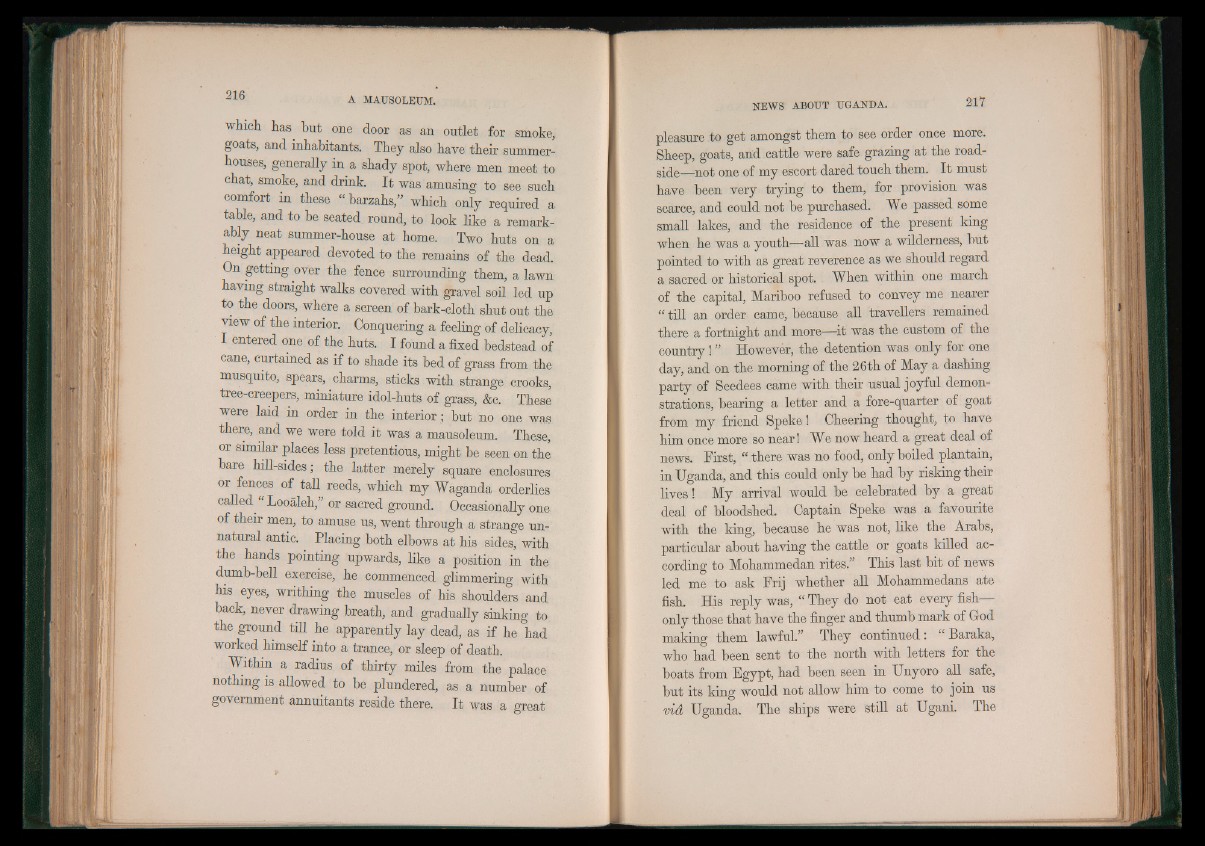
which has but one door as an outlet for smoke,
goats, and inhabitants. They also have their summerhouses,
generally in a shady spot, where men meet to
chat, smoke, and drink. It was amusing to see such
comfort in these “ barzahs,” which only required a
table, and to be seated, round, to look like a remarkably
neat summer-house at home. Two huts on a
height appeared devoted to the remains of the dead.
On getting over the fence surrounding them, a lawn
having straight walks covered with gravel sod led up
to the doors, where a screen of bark-cloth shut out the
view of the interior. Conquering a feeling of delicacy,
I entered one of the huts. I found a fixed bedstead of
cane, curtained as if to shade its bed of grass from the
musquito, spears, charms, sticks with strange crooks,
tree-creepers, miniature idol-huts of grass, &c. These
were laid in order in the interior; but no one was
there, and we were told it was a mausoleum. These,
or similar places less pretentious, might be seen on the
bare hill-sides; the latter merely square enclosures
or fences of tall reeds, which my Waganda orderlies
called “ Looaleh,” or sacred ground. Occasionally one
of their men, to amuse us, went through a strange unnatural
antic. ^ Placing both elbows at his sides, with
the hands pointing upwards, like a position in the
dumb-bell exercise, he commenced glimmering with
his eyes, writhing the muscles of his shoulders and
back, never drawing breath, and gradually sinking to
the ground till he apparently lay dead, as if he had
worked himself into a trance, or sleep of death.
Within a radius of thirty miles from the palace
nothing is allowed to be plundered, as a number of
government annuitants reside there. It was a great
pleasure to get amongst them to see order once more.
Sheep, goats, and cattle were safe grazing at the roadside—
not one of my escort dared touch them. It must
have been very trying to them, for provision was
scarce, and could not be purchased. We passed some
small lakes, and the residence of the present king
when he was a youth—all was now a wilderness, but
pointed to with as great reverence as we should regard
a sacred or historical spot. When within one march
of the capital, Mariboo refused to convey me nearer
“ till an order came, because all travellers remained
there a fortnight and more—it was the custom of the
country ! ” However, the detention was only for one
day, and on the morning of the 26 th of May a dashing
party of Seedees came with their usual joyful demonstrations,
bearing a letter and a fore-quarter of goat
from my friend Speke! Cheering thought, to have
him once more so near! We now heard a great deal of
news. First, “ there was no food, only boiled plantain,
in Uganda, and this could only be had by risking their
lives! My arrival would be celebrated by a great
deal of bloodshed. Captain Speke was a favourite
with the king, because he was not, like the Arabs,
particular about having the cattle or goats killed according
to Mohammedan rites.” This last bit of news
led me to ask Frij whether all Mohammedans ate
fish. His reply was, “ They do not eat every fish—
only those that have the finger and thumb mark of God
making them lawful.” They continued : “ Baraka,
who had been sent to the north with letters for the
boats from Egypt, had been seen in Unyoro all safe,
but its king would not allow him to come to join us
vid Uganda. The ships were still at Ugani. The